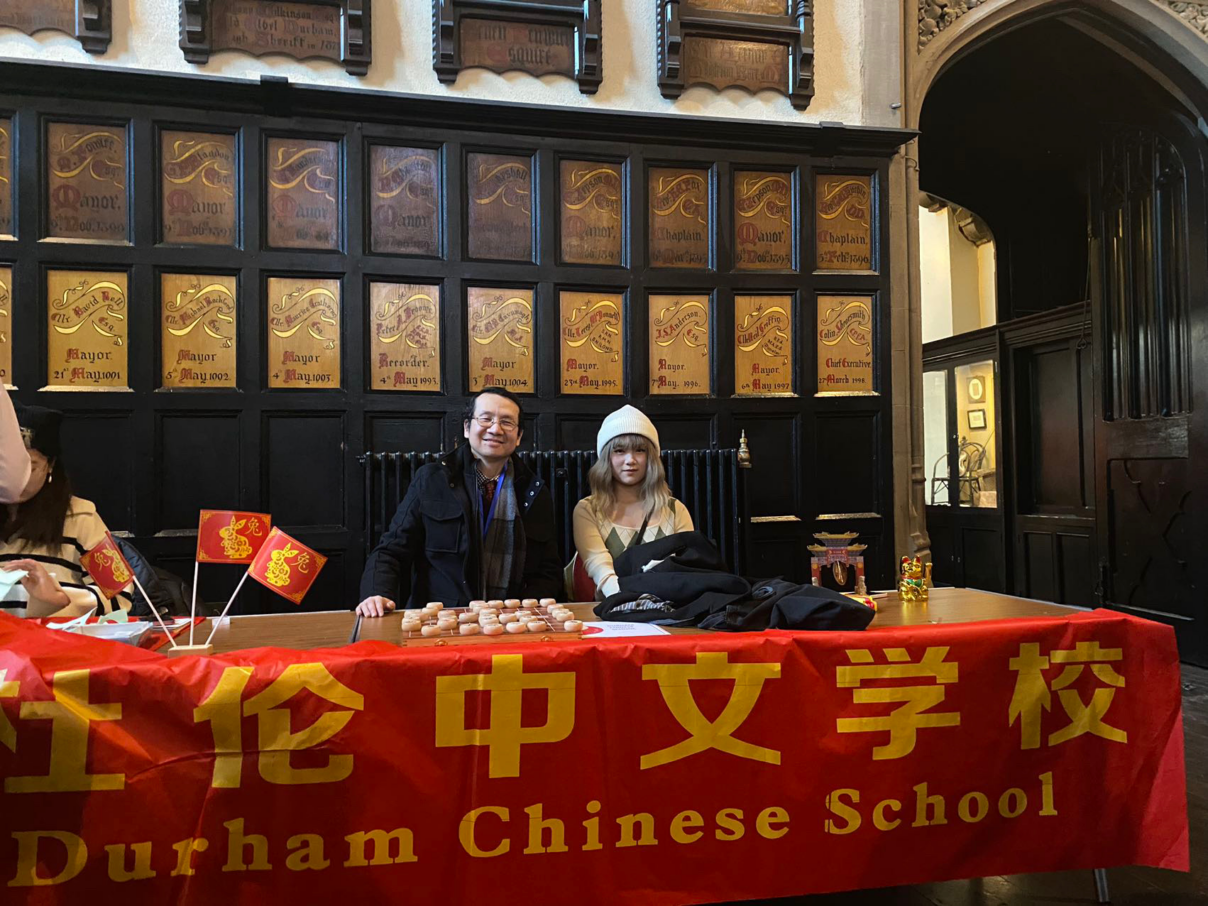2023 Durham Chinese New Year Celebrations: An Eyewitness Account
by Jiarui Yu
From 2022 to 2023, Durham Chinese School resumed in-person classes with thriving enrolment. Students and teachers alike are invigorated, enthusiastically embracing the spirit of academic renewal. After three years of the pandemic, our teachers and students show no signs of illness or weariness; instead, they are vibrant and dedicated, either wholeheartedly teaching or diligently studying. Nearing Chinese New Year’s Eve, our school, together with Durham County Council and Durham University, jointly organised the Chinese Lunar New Year celebrations on January 21st at Durham City Hall.

In the twelfth lunar month, amidst the deep winter of the North, a hint of spring emerged in the sunlight. Cold winds swept through, ancient castles stood firm, and the River Wear flowed around the hills. Descending north from the castle into the city centre, beside the statue of the Earl of Durham, markets bustled with crowds gathered around a red lion dance, a scene of vibrant activity. This resembled the prosperous days of old, with thousands of carriages and chariots entering the pass. Inside the City Hall, six-hundred-year-old timbers and stones were adorned with red lanterns and silk; deities carved into stained-glass windows gleamed above the main hall, flanked by four large red and blue insignias. Programs rotated continuously within the hall, with music and dances, creating a lively atmosphere.

A charity stall was set up near the entrance, selling various condiments like soy sauce and sweet chili sauce, all priced under two pounds, and distributing fortune cookies to children. This was a benevolent act by Westmill Foods, generously assisting Durham Chinese School with its operations. The tradition of charity bazaars, originating in the Southern Song Dynasty and flourishing in the Ming and Qing Dynasties, was often managed by benevolent halls and societies. Its principles and origins can be traced to ‘The Great Learning’: cultivating oneself, regulating one’s family, governing the state, and benefiting all beings—a classic for universal salvation. The world is often chaotic, and difficulties abound; saving the world and aiding the people is the solemn duty of our generation. Goods have a price, but culture is priceless. To transmit immortal words and thoughts through a perishable body is invaluable, and this is the origin of our predecessors’ establishment of this public school. In the eleventh year of Yongzheng (Qing Dynasty), Chen Hongmou, while serving as Yunnan Provincial Governor, established over seven hundred free schools, enabling Miao people to learn Han Chinese and study classics like the Classic of Filial Piety and the Expanded Meaning of the Great Learning. Later, some Miao people in the Southwest were able to read and take imperial examinations, rising to high positions; this marked the beginning of Yunnan Province’s sinicization. Durham Chinese School does not seek to transform people to take examinations, but rather to teach those eager to learn, to transmit culture in Western Europe.

A Western man was seen standing by the charity stall, over nine feet tall, with sword-like brows, an aquiline nose, red hair, and yellow beard, dressed in a long red and black robe with embroidered phoenixes. Although not from China, his wearing of Han attire demonstrates the spread of Chinese fashion in Western Europe, further highlighting the importance of establishing schools and imparting knowledge. However, attire is not synonymous with culture; understanding ethics, practicing civility, preserving Chinese rites and righteousness, and upholding the moral tradition allows one to belong, even if dressed differently, reflecting the profound meaning of the Spring and Autumn Annals. Our school set up a stall in the City Hall, teaching Chinese characters at the left booth and distributing paper-folded ‘Fu’ (good fortune) characters. Many families with children came. The teaching of characters is the transmission of culture, for characters are the mark of a people’s bloodline. In ancient times, children learned characters at three, poetry at five, and composition at seven, to preserve a people’s culture and ensure the flow of its lineage. Though ancient Egypt and ancient India perished, hieroglyphs and Sanskrit endure, allowing contemporary scholars to understand the brilliance of their cultures; Sanxingdui yielded no texts, making it difficult for historians to write about, thus culture endures when texts endure, and when culture endures, present and future generations will not be lost or bewildered. China is fortunate that classical Chinese, simplified Chinese, and traditional Chinese all survive to this day, which is why we, even when overseas, wholeheartedly run schools, and overseas Chinese eagerly seek education, all to preserve characters and culture.

Our school’s teachers performed two programs: one on the Pipa and one on the Guzheng, featuring a tune from Su Dongpo’s ‘Shuidiao Getou’. ‘The Book of Songs: Zhou Song’ says, ‘Bells and drums clang, chimes and flutes resound, blessings abound,’ playing music at Chinese New Year’s Eve ensures a year of blessings. Su Wen Zhong’s song, though not from the Shang or Zhou Dynasties, is an ancient tune transmitted to the present. The ancients played music to worship ancestors, heaven and earth, and the altars of grain and soil. Western Europeans less often worship ancestors, but frequently worship temples and altars of grain and soil. Their churches and ancient castles, with choirs, are ubiquitous. Today’s world is diverse and open; overseas Chinese can also perform their rituals and preserve their ancient music. Currently, our school actively seeks talented individuals to establish more interest classes in the future. When children learn characters and texts, listening to music and hearing tunes can further embody their culture.

Youth gathered around our right stall, playing Chinese chess around a long table. Modern Chinese chess, originating in the Song Dynasty and flourishing in the Ming and Qing Dynasties, teaches the national game and transmits Chinese culture. Western chess, strong in tactics, emphasizes strategy, while Chinese chess, strong in strategy, emphasizes overall planning. Western chess, after deployment, often results in quick exchanges and rapid endgame. Chinese chess emphasizes careful planning, stable formations, winning through conventional means, and surprising tactics. Comparing the two reveals differences in ancient Chinese and Western warfare, yet both illustrate the rise and fall of ancient and modern military strategists. Xiang Yu and Napoleon were both heroes of their time, winning countless battles, but one miscalculation led to utter defeat; Han Xin and Wellington, though starting with difficulties, could achieve miraculous victories, relying on flawless calculations. Achieving a blend of Chinese and Western cultures, preserving common principles, and understanding differences, this is also the aspiration of our school’s mission: to strive for a world of great harmony, mutual assistance, and equality. Chess boards also conceal ancient and modern stories and worldly principles that can be taught to children. ‘Zhuo’ (Pawn) advances one step at a time, like dripping water eroding stone, akin to Deng Ai of Wei in the Three Kingdoms, who rose from obscurity, diligently managed state affairs and studied classics for forty years, then once entering Sichuan, narrowly emerged from Yinping Pass to overthrow Shu Han; ‘Shi’ (Advisor) bears heavy responsibilities, taking benevolence as one’s duty, unlike Zhong Hui of Wei, who was treacherous and unjust, and after entering Western Sichuan, two advisors contended for glory, eventually leading to their demise. Our school spreads Chinese culture, ancient and modern stories, enabling those nearby to know their roots, and those far away to propagate culture and principles, seeking common ground while respecting differences, honouring the ‘Book of Rites’ principle: ‘Those who are alike love each other; those who are different respect each other.

Poem at the End: “Ren Yin replaced Gui Mao, Durham city filled with New Year cheer, welcoming a beautiful spring, diligent in study and effort.”

2023年杜伦中国新年活动亲历记
作者:于嘉睿
癸卯者,癸属阴之水,卯属阴之木,是水生木相生;而其前位壬寅者,壬属阳之水,寅属阳之木,亦是水生木相生。即壬寅癸卯之交,有阴阳之常变,而无生死性质之转。论先代壬寅癸卯之交,有刘备败于夷陵而奔白帝城,再失荆州托孤于诸葛武侯 (AD 222 – 223),亦有英王乔治三世请和于美利坚,签巴黎和约于凡尔赛宫 (AD 1782 – 1783)。然之于另一方,东吴胜而得荆州,美利坚败英王而独立。故壬寅癸卯之交,喜则存喜,运而留运,不变之中求变,亦为可进取之年。

2022至2023年,杜伦中文学校亦线下复课,生员济济。学生与老师皆精神焕发,慨然有重整学术之风。大疫三年后,师生无病色无萎靡,皆神采奕然,更有致心教授或刻苦攻读之志。时近除夕,本校与杜伦郡政府及杜伦大学等共同组织庆祝中国农历新年活动,于一月二十一日,杜伦市市政大厅。
腊月,北国之大寒,日光中透出春意。凛风四吹,古堡屹立,威尔河绕山潺流。由古堡北下入市中心,杜伦伯爵像旁,集市林立,人群围簇红狮舞,熙熙攘攘。此犹昔年全盛日,千车万乘入陉行。 入市政大厅,六百年古木岩石,红灯红绸缀上;圣堂之上刻神祗于七彩琉璃窗,左右挂红蓝巨章各四,堂中节目轮番,或奏乐,或歌舞,热闹非凡。

有义卖摊置于门内,卖酱油与甜辣酱等各酱料,其价皆不过两磅,又助发福饼于儿童。此乃英联食品公司(Westmill Food) 之善举,义助杜伦中文学校办学。当代义卖之源于南宋,兴于明清,多由善堂善会操办。其理其缘可溯 《大学》:修身齐家治国,利济万物之经典。天下易乱,世界多难,救世济民为今辈之重任。货品有价,而文化无价,以可腐之躯传不朽之文字思想,此千金难买,亦前辈立本公益学校之源。清雍正十一年,陈弘谋任云南布政司,立义学七百余所,苗民得以就汉学,授孝经,大学衍义,后西南苗能读书取科,登堂拜相,此云南省汉化之始。杜伦中文学校不求化民取科,但求教授向学之人,传文化于西欧。

但见一西洋汉子,立于义卖摊旁,身高九尺有余,剑眉鹰鼻,赤发黄须,着红黑长袍,胯腿绣凤。其虽非中土之人,而着汉装,此乃彰华夏衣冠传于西欧也,更显兴学授教之要。然衣冠未可与文化言同,知伦理,习文教,存华夏礼义而承道统,虽披发左衽亦可归也,此春秋之大义。本校于市政大厅摆摊,于左摊教授中国文字,并折纸送福,有子女之家多来。文字之传授,即文化之传承,文字为一族血脉之标也。古者三岁识字,五岁学诗,七岁作文,是保一族文化之存,血脉之流。古埃及与古印度虽皆亡,而圣书体与梵文至今仍存,盖今辈考究知其文化之璀璨也;三星堆出土了无文字,史家难书也,故文字存而文化存,文化存而今人后人可不迷茫惘然也。中国尚幸,文言文,简体文,繁体文至今皆存,是以今辈虽身处海外,亦致心办学,华裔亦求学心切,皆为保文字存文化也。

本校教师出演节目有二,一为琵琶,一为古筝,有苏东坡《水调歌头》之曲。《诗经:周颂》有云,“钟鼓喤喤,磬筦将将,降福穰穰”,除夕奏乐,保一年福祉也。苏文忠之歌虽非商周之乐,亦为古曲传今。先人之奏乐,为祭祀祖宗,天地,社稷。西欧人少祭祖,而常祭宗庙社稷。其教堂古堡,唱诗班随处可见。今日之世界多元且开放,海外华裔亦可行其祭祀,留其古乐。今本校多求贤才,为日后开兴趣班所用。儿童习文识字之时,若听乐闻曲,更可体其文化。
青年多聚于本校右摊,围长桌下中国象棋。今者现代象棋,起于宋代,兴于明清,教授国棋,亦传华夏文化。 西欧亦有象棋,其胜在术,重战术,国棋其胜在策,重策略。西欧之棋,排兵布阵后,一朝换子,则风卷残云,速入残局。国棋重运筹帷幄,稳其阵型,以正合,以奇胜。二者相比可见中西古战争之别,然二者皆述古今兵家兴衰之理,项羽,拿破仑皆世之豪杰,二人皆百战不败,而一朝算错,即大败亏输;韩信,威灵顿虽入局艰辛,后可出奇制胜,皆仗算无遗策也。得中西文化之交融,存共理,知差异,此亦本校办学之志,以求世界大同,互助而平等。棋盘之中亦藏古今故事及世理,可授于儿童。卒者,日拱一步,积水穿石,如三国魏之邓艾,起于微末,四十年如一日实干政务且研读经典,一朝入川,险出阴平命门,覆灭蜀汉;士者,任重道远,仁以己任,若不仁不义如魏之钟会,入西川后二士争功,终被一车换二士,三者皆授首。本校传播华夏文化,古今故事,使近者知落叶知根,江入海知源,于远者可弘文传理,求同存异,尊‘礼记’之礼,‘同则相亲,异则相敬’。
夫作诗为尾:壬寅换癸卯,杜伦满城年,更迎春光好,治学勤且勉。
